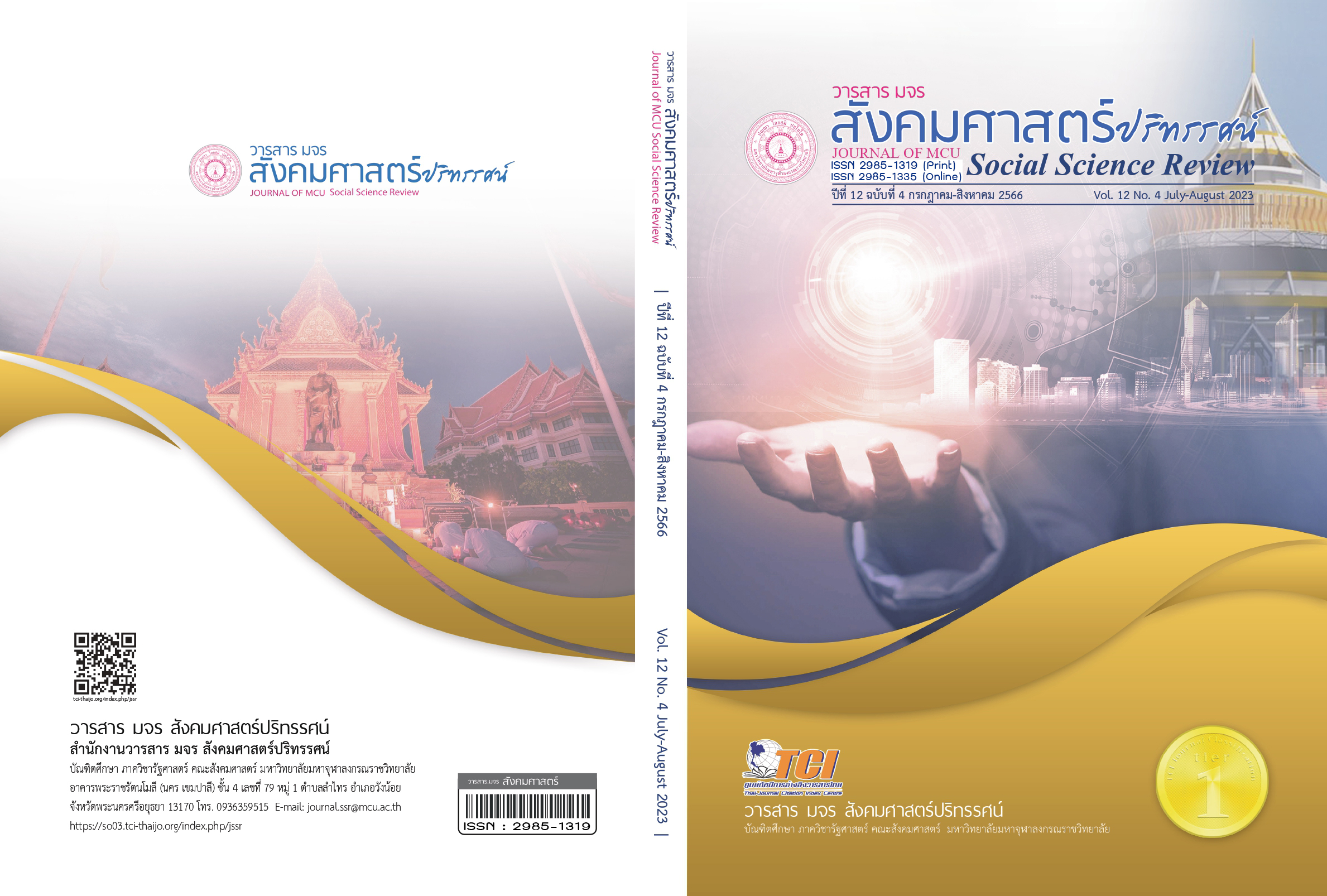การพัฒนาศาสนทายาทต้นแบบของคณะสงฆ์ จังหวัดปทุมธานี
คำสำคัญ:
กระบวนการ, รูปแบบการพัฒนา, ศาสนทายาทบทคัดย่อ
บทความวิจัยนี้มีวัตถุประสงค์ 1. เพื่อศึกษาสภาพทั่วไปในการพัฒนาศาสนทายาท2. เพื่อศึกษากระบวนการในการพัฒนาศาสนทายาท 3. เพื่อนำเสนอรูปแบบการพัฒนาศาสนทายาทต้นแบบของคณะสงฆ์ จังหวัดปทุมธานี
ผลการวิจัยพบว่า กระบวนการในการพัฒนาศาสนทายาทของคณะสงฆ์ จังหวัดปทุมธานี มีวิธีการดังนี้ด้านการฝึกอบรม จัดให้มีการฝึกอบรม หลักสูตรตั้งแต่พรรษา 1 ถึงพรรษา 5 ด้านการศึกษา วางแนวทางการศึกษา กระบวนการศึกษาแนวพุทธศาสน์ พระปริยัติธรรม การศึกษาเล่าเรียน นักธรรม บาลี ด้านการพัฒนา ได้วางแผนและดำเนินการจัดกิจกรรมพัฒนาพระภิกษุให้ครอบคลุมทั้งผู้บริหาร ครูผู้สอน และบุคลากรทางการศึกษา ไตรสิกขา คือ ศีล ด้านพระวินัย ศีล 227 ข้อ สมาธิ ความตั้งมั่นแห่งจิต เป็นวิธีการฝึกพัฒนาจิตใจ ปัญญาเป็นหลักการพัฒนาความรู้ความเข้าใจ รูปแบบการพัฒนาศาสนทายาทต้นแบบของคณะสงฆ์ จังหวัดปทุมธานี จึงต้องนำกระบวนการ การฝีกอบรม การศึกษา การพัฒนาตาม ไตรสิกขา คือ ศีล สมาธิ ปัญญา ได้แก่ ด้านการฝึกอบรม ต้องมีแผนงานแต่ละขั้นตอนของกระบวนการ ด้านการศึกษา ส่งเสริมการศึกษาความรู้มีแบบอย่าง แบบแผน แบบฉบับหล่อหลอม การพัฒนา พัฒนาความรู้ฝ่ายต่าง ๆ ในองค์กร เป็นต้น มีคุณลักษณะ 5 ด้านดังนี้ 1) บุคลิกภาพ ควรมีบุคลิกที่เหมาะสมกับการเข้ามาบรรพชาเป็นพระภิกษุ เสขิยวัตร ทำให้เกิดความเป็นระเบียบ เรียบร้อย สงบ สำรวม สง่างาม แก่ผู้ที่มาพบเห็น 2) วิชาการ มีความรอบรู้พุทธประวัติ พระธรรมวินัย 3) ทักษะ มีความเชี่ยวชาญ ทักษะการด้านการสื่อสาร 4) เจตคติ คิดดี มีความปรารถนาที่ดี มีเมตตาต่อสรรพสัตว์ 5) ด้านความคิดสร้างสรรค์ ผสมผสานความคิดสร้างสรรค์ทำให้เกิดปัญญา
เอกสารอ้างอิง
พระครูปลัดเสนาะ วิสุทฺโธ. (2564). ปัจจัยที่ส่งเสริมการปฏิบัติหน้าที่ของพระวินยาธิการ อำเภอคลองหลวง จังหวัดปทุมธานี. วารสาร มจร สังคมศาสตร์ปริทรรศน์, 10(4), 66-75.
พระครูศรีอรรถศาสก์ (อรรถชัย มหาอตฺโถ). (2560). การพัฒนาประสิทธิภาพการจัดการศึกษาพระปริยัติธรรมแผนกบาลี ของคณะสงฆ์ ภาค 14. วารสาร มจร สังคมศาสตร์ปริทรรศน์, 6(2 - ฉบับพิเศษ), 239-254.
พระมหาทวี วิสารโท. (2560). การบวชเป็นศาสนทายาทในพุทธศาสนาแบบเถรวาท. วารสาร มจร สังคมศาสตร์ปริทรรศน์, 6(1), 15-26.
พระมหาวิศิต ธีรวํโส. (2562). การพัฒนาสมรรถนะของพระสังฆาธิการในจังหวัดสุรินทร.วารสารมจร พุทธปัญญาปริทรรศน์, 4(1), 169-180.
พระมหาสุริยา คั้นพ๊าบ. (2562). การพัฒนารูปแบบการบริหารการศึกษาตามหลักพุทธบริหารการการศึกษาของคณะสงฆ์มหายานในประเทศไทย. วารสารมหาจุฬานาครทรรศน์, 6(1), 173-186.
พระมหาอภิชาติ ฌานสุโภ. (2564). รูปแบบการฝึกอบรมพระนวกะ สำหรับวัดในประเทศไทย. วารสารครุศาสตร์ปริทรรศน์, 8(1), 26-39.
พระสุวรรณ ธมฺมาวุโธ. (2561). การพัฒนาทักษะภาวะผู้นำการเปลี่ยนแปลงสำหรับผู้บริหารตามหลักพุทธบริหารการศึกษา สำนักเรียนพระปริยัติธรรม แผนกบาลีในเขตการปกครองคณะสงฆ์ ภาค 1 (วิทยานิพนธ์ปริญญาพุทธศาสตรดุษฎีบัณฑิต สาขาวิชาพุทธบริหารการศึกษา). พระนครศรีอยุธยา: มหาวิทยาลัยมหาจุฬาลงกรณราชวิทยาลัย.
พระอภินันท์ อภินนฺโท. (2556). การพัฒนาบุคลิกภาพตามหลักเสขิยวัตร (วิทยานิพนธ์ปริญญาพุทธศาสตรมหาบัณฑิต สาขาวิชาการพัฒนาสังคม). พระนครศรีอยุธยา: มหาวิทยาลัยมหาจุฬาลงกรณราชวิทยาลัย.
มนูญ คันธประภา. (2553). ทัศนคติในการนำหลักธรรมทางพระพุทธศาสนาไปใช้ในการดำเนินชีวิตศึกษาเฉพาะกรณี นักศึกษามหาวิทยาลัยเทคโนโลยีราชมงคลพระนคร.วารสารวิชาการและวิจัย มทร.พระนคร, 4(2), 65-72.
มยุรี เสือคำราม. (2561). การพัฒนาแผนการจัดการเรียนรู้เพื่อพัฒนาความคิดสร้างสรรค์โดยใช้ทฤษฎี C-K และโมเดล PIPE: กรณีศึกษานักศึกษามหาวิทยาลัยเชิงสร้างสรรค์ที่ได้รับการสอนตามทฤษฎี (รายงานวิจัยฉบับสมบูรณ์). กรุงเทพฯ: สำนักงานคณะกรรมการส่งเสริมวิทยาศาสตร์ วิจัยและนวัตกรรม.
อินถา ศิริวรรณ. (2558). การศึกษาแนวทางพัฒนาการศึกษาของคณะสงฆ์. วารสารครุศาสตร์ปริทรรศน์, 2(2), 10-23.
ดาวน์โหลด
เผยแพร่แล้ว
รูปแบบการอ้างอิง
ฉบับ
ประเภทบทความ
สัญญาอนุญาต
ลิขสิทธิ์ (c) 2023 วารสาร มจร สังคมศาสตร์ปริทรรศน์

อนุญาตภายใต้เงื่อนไข Creative Commons Attribution-NonCommercial-NoDerivatives 4.0 International License.
เพื่อให้เป็นไปตามกฎหมายลิขสิทธิ์ ผู้นิพนธ์ทุกท่านต้องลงลายมือชื่อในแบบฟอร์มใบมอบลิขสิทธิ์บทความให้แก่วารสารฯ พร้อมกับบทความต้นฉบับที่ได้แก้ไขครั้งสุดท้าย นอกจากนี้ ผู้นิพนธ์ทุกท่านต้องยืนยันว่าบทความต้นฉบับที่ส่งมาตีพิมพ์นั้น ได้ส่งมาตีพิมพ์เฉพาะในวารสาร มจร สังคมศาสตร์ปริทรรศน์ เพียงแห่งเดียวเท่านั้น หากมีการใช้ภาพหรือตารางหรือเนื้อหาอื่นๆ ของผู้นิพนธ์อื่นที่ปรากฏในสิ่งตีพิมพ์อื่นมาแล้ว ผู้นิพนธ์ต้องขออนุญาตเจ้าของลิขสิทธิ์ก่อน พร้อมทั้งแสดงหนังสือที่ได้รับการยินยอมต่อบรรณาธิการ ก่อนที่บทความจะได้รับการตีพิมพ์ หากไม่เป็นไปตามข้อกำหนดเบื้องต้น ทางวารสารจะถอดบทความของท่านออกโดยไม่มีข้อยกเว้นใดๆ ทั้งสิ้น





